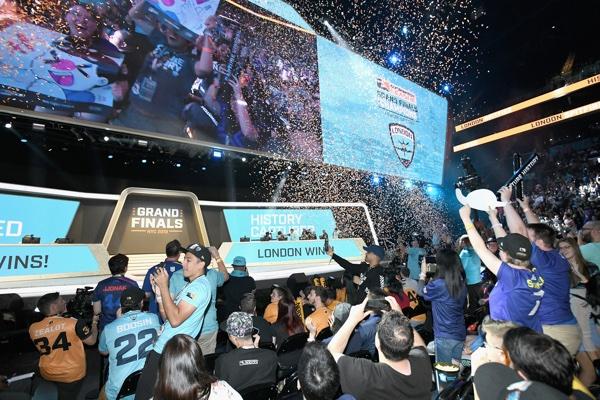I was on a first date this summer (yeah, I go on dates) and I asked my date about her weekend. I knew this question could change the vibe of the date (I'll get to that in a moment), but I went ahead with it anyway.
She told me she spends most of her summer weekends "out East," meaning, for those outside the NYC area, the Hamptons, . "Do you go out East?" she then asked me.
"No," I answered, with a little bit of a smirk. "I report on the NBA 2K League, an esports league operated by the NBA, featuring a basketball video game."
"So you watch people play video games?" she asked.
In her defense, this is a conversation I've had a significant amount of times the past couple years. I'm ready for it and I'm ready to lay out my argument, which is not really an argument, but more of a summary of the progression in technology and accessibility of video games.
And by asking about her weekend, I knew this was coming.
Girl: “I go out to the Hamptons on weekends during the summer.”
Me (flirting): “I cover the @NBA2KLeague.”
Girl: “What’s that?”
Me: pic.twitter.com/DSvaVLBb5d
— Jeff Eisenband (@JeffEisenband) July 10, 2018
I am 25. I am part of a generation that grew up on video games. My parents played the original Nintendo when I was a toddler. By the time I could start using my hands, I had a Super Nintendo controller in them. I was locked into GameCube in elementary school. I got an Xbox 360 for my Bar Mitzvah and I got an Xbox One for my 21st birthday.
Growing up, I wondered, "Will I ever stop playing video games? Adults don't play that much, but they didn't grow up on these consoles. Will I play with my kids?"
It's National Video Games Day 2018 and I'm starting to get my answer. I don't have kids yet, but I'm very much in the thick of the gaming world. I report on video games as part of my job here at ThePostGame. I host content for the NBA Twitch channel. This past summer, I served as a social media reporter and on-stream analyst for the NBA 2K League. I'm revving up my personal Twitch. Video games are a part of my life, but more importantly, they are popular around the world and not just among the youth.
For those who say, "People won't watch people play video games," check the data. People are doing just that and that population is only expanding.
I use a personal example to communicate the growth of esports. When I was in my early teens, Madden NFL was my main game. In December 2005, Madden Nation debuted on ESPN2 and I was hyped to watch. These guys got to play Madden as a job while traveling around the country in a Madden-themed bus.
But as a consumer, I was let down. All I wanted to see was the best players in the world playing Madden. Instead, the program operated more like a reality TV show, highlighting the players' background stories and relationships with each other, with only a few minutes of actual gameplay sprinkled in. After all, this was designed for 30 minutes of TV and airing one Madden game would take up the whole episode. Still, 12-year-old me was fed up with this structure.
I've doubled in age, but technology advanced at a more exponential rate. I just missed the YouTube-gamer generation. During the past decade, when kids have enjoyed a video game -- the way I once loved Madden -- they have had the opportunity at their fingertips to watch the best players in the world compete or show off their skills. All these kids have had to do is open YouTube or log into Twitch. Kids today have an instant, deep content pool to choose from. They don't have to check the channel guide for Madden Nation to watch re-runs.
If you're into Fortnite, Call of Duty, NBA 2K, Street Fighter, Overwatch, League of Legends, it's all there. Heck, you can catch people playing old Nintendo 64 or Dreamcast games if they can get the connection going on Twitch.
Last winter, I sat down with Milwaukee Bucks President Peter Feigin for ThePostGame. He told me that when his mom asked why people would want to watch the NBA 2K League, he explained how it is a "competition" and people want to learn the best practices of the game. I think this is the simplest way to sum up not just the boom of video games, but the blast of esports. Video games are a social, competitive hobby. Of course people want to study and watch the best.
I don't spend much time trying to convince people in sports business to take interest in video games and esports at the personal level. If you didn't grow up on video games, I get how you can't find them interesting as an adult.

But for anyone thinking gaming and esports are a "fad," you're kidding yourself. Esports are a global phenomenon and thanks to generational turnover, the average age in the gaming world is rising. Colleges are offering scholarships for gamers. The wealthiest owners from North American sports leagues are making their own investments into these growing esports leagues. TV networks on getting in on the game. The Overwatch League Finals sold out Barclays Center two straight days in July. This should put everyone on notice.
Video games/esports are not on the level of TV, music, film and traditional sports in global culture yet, but they are well on their way to inching in there. You can choose to deny the growth or embrace it. I'd recommend the latter.
And if you're a Hamptons person, maybe take one weekend off and catch some NBA 2K League action next summer.
-- Follow Jeff Eisenband on Twitter @JeffEisenband. Like Jeff Eisenband on Facebook.





